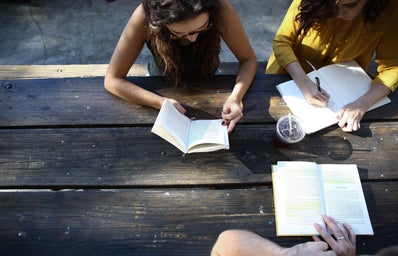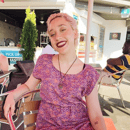In 2021, I reignited my love for reading after seeing countless, passionate readers on Instagram and TikTok talking about the most incredible novels they picked up in 2020.
When January 2021 began, I made a resolution to read 25 books throughout the year. It’s September and I’ve finished 33. Amid my burgeoning book obsession, I stumbled across a group called The Young Writers Initiative where they were hiring volunteer counsellors for their second annual virtual writing summer camp. I didn’t think twice––I wanted an outlet to read and write whilst being part of the literary world I missed so desperately.
I worked in the nonfiction category. I was worried that as a journalism major, I wouldn’t be able to share my love for nonfiction with my young campers, who at first glance, seemed more interested in fantasy and sci-fi. As a 24-year-old, I was about 10 years older than most of the kids in the nonfiction category and I was shocked when they responded to my daily prompts by opening up and writing about vulnerable moments in their lives. The campers wrote daily about their ambitions, fears, people they trusted, people who they accidentally hurt, stories from their culture and family traditions. I read hundreds of these honest and heartfelt pieces. As the weeks continued, so did their enthusiasm. Throughout the summer, I received numerous messages from campers admitting that they felt inspired by nonfiction writing and wanted to study journalism. Witnessing their passion reminded me of why I decided to study journalism in the first place.
I was a huge bookworm as a kid; I spent countless days picking up any book that looked like it could have a spunky female protagonist. But by the end of high school, the only books I was reading were required course readings that I couldn’t find the SparkNotes summary for. Somewhere in between writing a dozen essays about Lord of the Flies and being an overall grumpy, young millennial, I went to school for journalism. I had no idea what kind of writing I wanted to do, just that I wanted to do it. As soon as I got into the swing of reading again, I found myself less drawn to the fantasy world that appealed so much to me as a child and more into the world of truth. As journalism school progressed, I really began to believe the statement that “truth is stranger than fiction.”
My campers reminded me what it meant to write with your whole heart. They created pieces that were full of passion and authenticity. I had a camper once tell me that they felt like giving up before nonfiction camp started; they didn’t want to be a novelist and weren’t really considered an aspiring writer by their peers. That camper, now relating to nonfiction as a genre, could see themselves becoming a journalist or essayist. It made my heart soar.
My campers were smart and thoughtful – they were ready to hop into a Discord at any given time to chat about any type of writing. They had tons to say about the ethics of travel writing and colonialism, the subjectivity of truth, representation of LGBTQ+ people, and how cultures and traditions appeared in literature. We talked about the incredible nonfiction graphic novels of Alison Bechdel; the travel experiences of Joe Sacco in Palestine and the works of Anthony Bourdain’s international food writing. As a counsellor, I watched the campers engage in conversations with one another from different parts of the world to discuss nonfiction without judgement.
I’d like to think that the kids learned as much from each other as I did from them. All of a sudden, I remembered what it felt like to be in high school again, frustrated that your teacher never really explained that weird metaphor Shakespeare used and feeling helpless when writing yet another essay about The Great Gatsby. I reminded my campers that nonfiction was an under-appreciated genre – that the magic of reading inspires our strange, yet beautiful real-world experiences. From June to August, I felt like I was a part of the next generation of bestselling writers, memoirists, essayists, screenwriters and journalists. Since camp ended, I’ve seen dozens of campers move on to start their own blogs and podcasts. They’ve published zines and anthologies; one of them even started a digital magazine. I can’t wait to see what they go on to create. Camp reminded me that when I write, I need to create something authentic because I know that somewhere around the world, my campers are doing the same thing, too.





